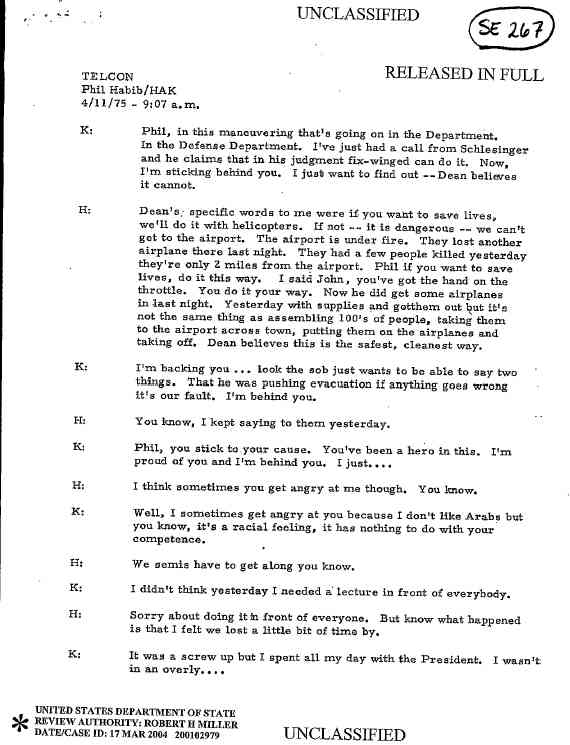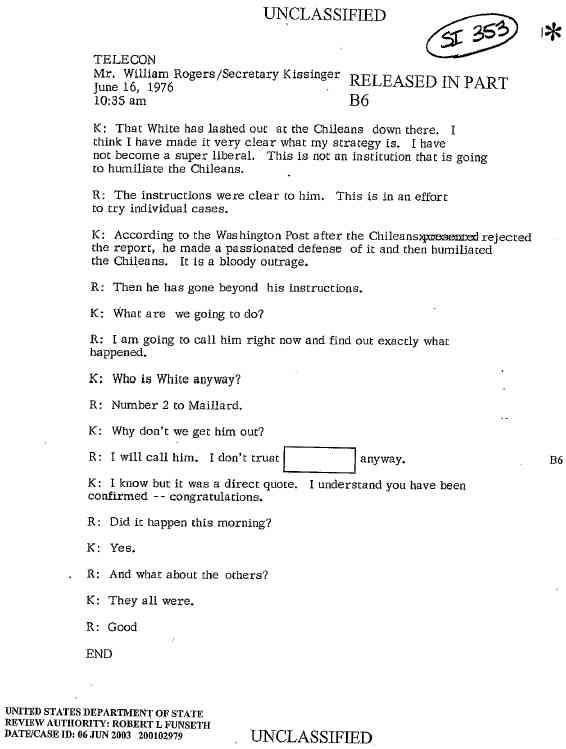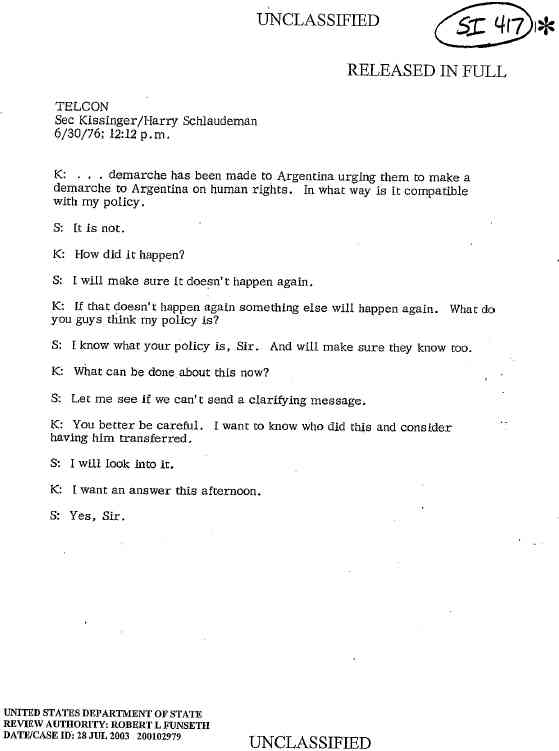|
Henry Kissinger
Telephone Conversation Transcriptions
5,771 pages of Henry Kissinger telephone conversation transcriptions (telcons). Telcons of telephone conversations taking place from January 1973 through January 1977.
These conversations took place while Kissinger served as both Secretary of State and National Security Adviser. The telcons contain Dr. Kissinger's often candid comments on a wide variety of issues. They provide a uniquely personal and intimate perspective to the events of the day in which Dr. Kissinger was involved. Henry Kissinger's personality and his sense of humor and occasionally his anger, comes through in the telcons, which show the importance of personal relations and personality in his diplomacy and national security relations. The telcons flesh out the already rich documentary record of foreign policy during Kissinger's tenure.
Among the many participants in the recording are: Richard Nixon, Lawrence S. Eagleburger, Brent Scowcroft, President Gerald Ford, Alexander Haig, Robert McNamara, Cyrus Vance, William Colby, Hubert Humphrey, Elliot Richardson, Dean Rusk, Senator Ted. Kennedy, National Review Editor William F. Buckley, ABC newsman Ted Koppel, Paul Bremer, Soviet Ambassador Anatoly Dobrynin, Chief Justice Warren Burger, William Paley, David Rockefeller, Roy Wilkins, Senator Hubert Humphrey, Joe Califano, George Meany, James Reston, Ben Bradlee, David Frost, Joseph Alsop, Patrick Moynihan, Eric Severeid, Richard Daley, Jack Valenti, Mike Wallace, Winson Lord, Nelson Rockefeller, Adlai Stevenson, McGeorge Bundy, Frank Sinatra and Lisa Minelli.
Henry Kissinger's secretaries transcribed his telephone conversations as National Security Adviser and Secretary of State. The original transcripts were never edited at the time they were typed. Initially, secretaries listened in on calls using a "dead key" extension on the phone system and prepared summaries of conversations. This practice was later refined and resulted in verbatim transcripts transcribed from secretarial shorthand notes. While most of the conversations were recorded by secretaries listening in on "dead keys" many conversations were recorded mechanically with tapes that were immediately transcribed and then destroyed, according to Dr. Kissinger's 1999 letter to the editor of Foreign Affairs. It is not known what became of the secretarial notes upon which the telcons were based. Nor is it known how the conversations were recorded. While it is not usually possible to determine which telcons were prepared from secretaries listening in on a "dead key" and which were prepared from tape recordings, some telcons contain a notation such as "(tape)" or "end of tape."
Just before leaving government service in 1977, Dr. Kissinger had these telcons, the telcons he generated during the Nixon Administration, and other personal records moved from his office at the State Department to a vault at David Rockefeller's estate in New York. Kissinger considered these documents to be personal material. They remained there briefly until they were given to the Library of Congress under the terms of a deed of gift with the provision that public access to them be restricted until five years after his death. After that time, the records could be read by the public as long as the individuals with whom Dr. Kissinger was speaking had also died or had approved of their release.
In the late 1970s, a reporter and two organizations sued to gain access to the telcons under the Freedom of Information Act (FOIA). The federal district court and the US court of appeals both ruled that the documents were government records because they were prepared on government time by government employees. These lower courts stated that the State Department telcons should be returned to the State Department and reviewed for release under FOIA.
In 1980, the Supreme Court, in Kissinger v. Reporters Committee for Freedom of the Press, 445 US. 136 (1980), reversed the decision, ruling that the FOIA did not apply to the telcons because they were outside of the Executive branch. The Court noted, however, that the Federal Records Act (FRA) provided authority for the Archivist of the United States, the agency head, and the Attorney General to recover improperly removed records. Accordingly, at the National Archives's behest, then Secretary of State Edmund Muskie agreed in 1980 to re-review the telcons at the Library of Congress for possible return to the State Department.
However, that review never took place. In preparation for publishing a book (Crisis: The Anatomy of Two Major Foreign Policy Crises), Dr. Kissinger compiled many telcons relating to three foreign policy crises: the 1973 Middle East War, the 1974 Cyprus crisis, and the fall of Saigon in 1975; he submitted these documents to the National Security Council (NSC) for declassification review. In 2001, Dr. Kissinger, upon request from National Archives and Records Administration and the State Department following inquiries from researchers, gave both agencies copies of the transcripts held at the Library of Congress. In October 2004, in response to a Freedom of Information Act request, The Department of State released telcons from Kissinger's stint in the State Department, from 1973 to 1977.
Among the many highlights of the conversations are:
April 11, 1975 - In a conversation with Assistant Secretary of State for East Asian and Pacific Affairs Philip Habib, a discussion takes place on the situation in Cambodia. Cambodian leader Lon Nol has left the country and the capital, Phnom Penh, is about to fall to the Khmer Rouge.Mention is made of Operation Eagle Pull, a plan to evacuate the United States ambassador to Cambodia and other Americans from Phnom Penh.
April 29, 1975 - Henry Kissinger receives a call from news reporter Ken Fried, who informs him that South Vietnamese leader General Duong Van Minh has surrendered to the North Vietnam's People's Liberation Armed Forces.
June 5, 1975 - Henry Kissinger receives a call from syndicated newspaper columnist Jack Anderson. Anderson, the writer of the column "Washington Merry Go Round," has received a leaked document concerning a meeting between Kissinger and French foreign minister Michel Jobert. The conversation with Jobert took place during the Arab oil embargo. Kissinger and Jobert discussed the administration's feeling about the actions of the Shah of Iran and the possibility of using military force to seize oil fields in the Middle East.
November 5, 1975 - In the aftermath of the Halloween Massacre, Kissinger calls former Secretary of Defense James Schlesinger. The "Halloween Massacre" was a move designed by President Ford's chief of staff, Donald Rumsfeld. On October 31, 1975, President Ford removed Kissinger from his role as National Security Adviser and replaced him with his deputy Brent Scowcroft. Kissinger remained Secretary of State..Secretary of Defense James Schlesinger and CIA Director William Colby were fired. Donald Rumsfeld replaced Schlesinger as Secretary of Defense and George Bush replaced Colby as CIA director.
January 16, 1976 - Frank Sinatra calls Henry Kissinger to ask him to attend a dinner in Los Angeles, Sinatra was organizing for Prime Minister Itzak Rabin. Mention is made of the of the Angola crisis. When Sinatra asks, "Do you want me to straiten-out Angola for you." Kissinger replies by saying, "I need some of your enforcers."
June 16, 1976 - Henry Kissinger, shortly after returning from Santiago, where he had a face-to-face meeting with Chilean dictator Augusto Pinchot, Kissinger speaks with Assistant Secretary of State for Latin America, William Rogers. Kissinger is angry that a State Department official, Robert White, has criticized Pinochet for dismissing an Organization of American States' report on human right abuses in Chile.
June 30, 1976 - During a telephone call with aid on Latin America Henry Schlademan, Kissinger express displeasure over the issuance of a demarche to the ruling Argentine military junta. A demarche is a form of diplomatic protest. The demarche was issued by the State Department's Latin America arm, in response to reports that death squad activity against leftist forces in Argentina was on the rise.
|
|


